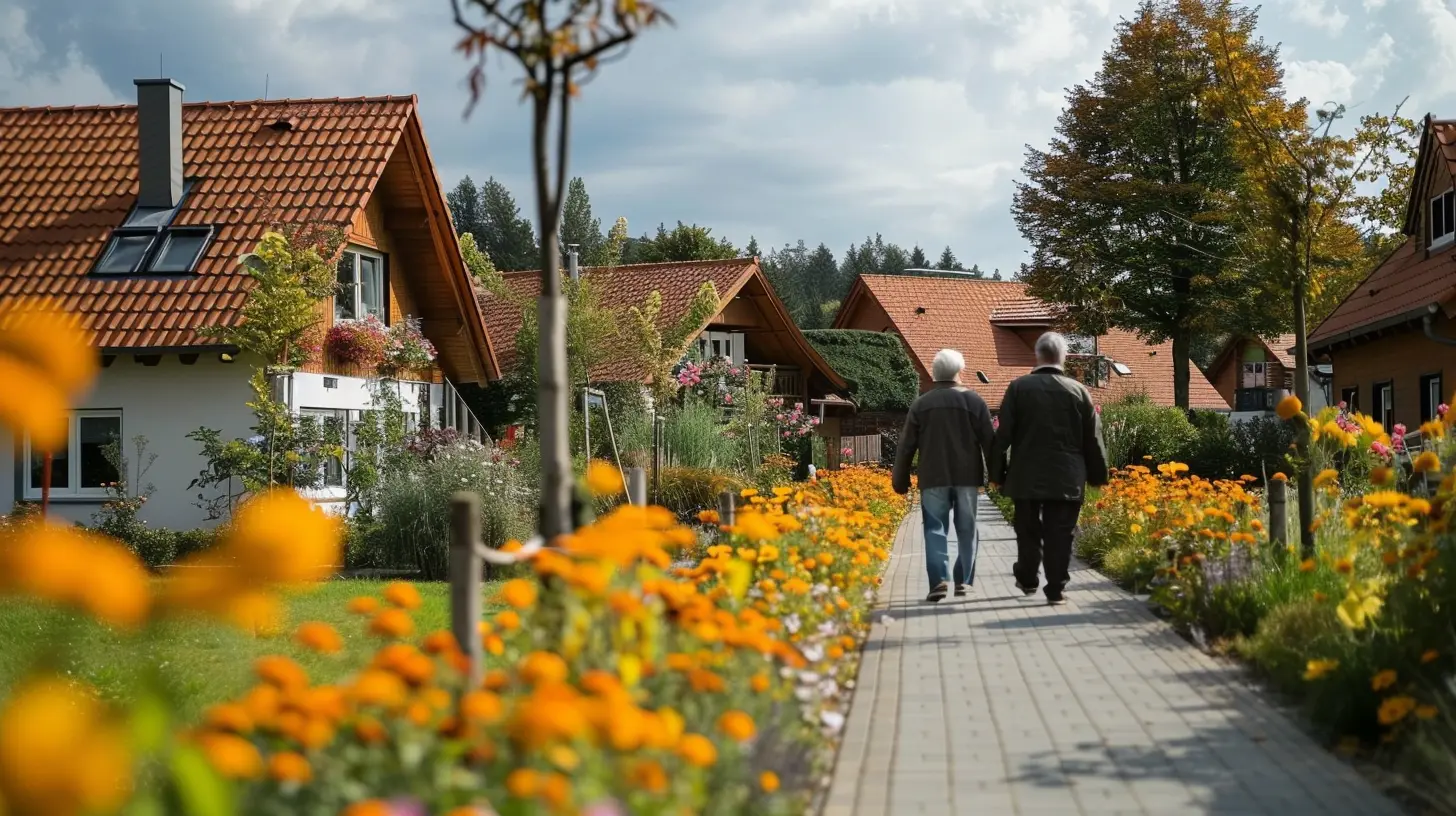How to Maintain Your Independence in a Retirement Home
28 May 2025
Moving into a retirement home can feel like you're giving up some of the freedoms you’ve enjoyed your whole life. I get it—it’s a big change. But here’s the thing: living in a retirement home doesn’t mean you have to lose your independence. In fact, with the right mindset and some practical steps, you can maintain a fulfilling and independent lifestyle no matter where you live.
In this article, we’re going to break down everything you need to know about staying independent in a retirement home. From maintaining control over your daily life to staying socially active, this guide will help you take charge of your golden years.
Why Independence Matters in a Retirement Home
Let’s start with the obvious: independence is a big deal. It’s part of what makes you, well… you! Being independent isn’t just about doing things for yourself—it’s about having the freedom to make your own decisions, pursue your interests, and live life on your own terms.The good news? Moving to a retirement home doesn’t mean you have to give that up. In fact, most modern retirement communities are designed to support your autonomy while providing the care and assistance you need when (and if) you want it.
But maintaining independence isn’t something that just happens automatically. It takes a little bit of effort and active planning—not in a stressful way, but in a way that empowers you to live life the way you want.
1. Choose the Right Retirement Home for Your Needs
This one’s huge. If you’re serious about maintaining your independence, the first step is finding a retirement home that aligns with your values and lifestyle. Not all retirement homes are created equal, so take your time and do your research.Here are some factors to consider:
- Amenities and Services: Look for options that allow you to maintain control over your day, like kitchens in your unit, laundry services, or outdoor spaces for gardening.- Flexibility: Ask about the level of independence allowed. Can you cook your own meals? Come and go as you please? Have visitors whenever you like?
- Community Atmosphere: Visit the community in person to see if the vibe is a good fit. Do you feel comfortable with the staff and other residents? A supportive environment can make all the difference.
Remember: you’re not just choosing a place to live. You’re picking a community where you’ll thrive. Think of it like shopping for a pair of shoes—it needs to fit you, not the other way around.
2. Take Charge of Your Daily Routine
One of the easiest ways to preserve your independence is to create and stick to your own daily routine. Yes, retirement homes have their own schedules, but that doesn’t mean you have to conform 100% of the time.Some ideas for creating your own routine:
- Set your own wake-up and bedtimes. No one likes being told when to sleep!- Plan your meals. If your retirement home lets you cook or prepare meals, great! If not, you can still make decisions about what you eat.
- Schedule personal activities. Whether it’s time for reading, exercising, or practicing a hobby, carve out time for yourself.
Think of your routine as your personal road map. It helps you stay in control of your day, no matter what’s going on around you.
3. Stay Socially Connected
Let’s face it—loneliness can creep in when you feel like you’ve lost your independence. But staying socially active is one of the best ways to beat isolation and maintain your sense of self.Here’s how to do it:
- Make Friends in the Community: Start small by joining group activities, attending communal meals, or striking up conversations with other residents. Who knows? You might meet your next best friend.- Keep Old Connections Alive: Just because you’ve moved doesn’t mean you have to lose touch with friends and family. Schedule regular phone or video calls, invite people to visit, or plan outings together.
- Join Clubs or Groups: Most retirement homes have clubs or special interest groups. Whether it’s book clubs, gardening groups, or fitness classes, these can be a great way to meet like-minded people.
Social connections matter. They boost your mood, improve your overall health, and remind you that you’re part of something bigger than yourself.
4. Stick to Your Hobbies (or Discover New Ones)
Hobbies aren’t just a way to pass the time—they’re a way to express yourself and stay engaged with life. Moving to a retirement home is an opportunity to either continue doing what you love or try something completely new.Keep these tips in mind:
- Bring Your Favorite Pastimes with You: If you love painting, knitting, or gaming, make sure you’re set up to keep doing those things in your new space.- Try New Activities: Many retirement homes offer classes and workshops. Think of these as a chance to explore interests you never had time for before.
- Share Your Talents: Are you great at baking? A whiz at card games? Offer to tutor or teach others in the community. Sharing your skills is a great way to stay involved and independent.
Hobbies are like little anchors—they keep us grounded and provide a sense of purpose, no matter where we are.
5. Advocate for Yourself When Needed
Retirement homes are there to support you, but that doesn’t mean you should ever feel like you’re losing your voice. You have the right to speak up and advocate for your independence.Here’s how to be your own advocate:
- Communicate with Staff: If there’s something you need or want, let them know. Whether it’s dietary preferences, privacy concerns, or activity requests, don’t hesitate to speak up.- Know Your Rights: Familiarize yourself with the policies and rights outlined by the retirement home. You should always feel empowered to make your own choices.
- Enlist Support: If you’re having trouble getting your needs met, involve family members or other trusted individuals to help you navigate the situation.
Advocating for yourself doesn’t make you “difficult.” It ensures you’re getting the experience you deserve.
6. Prioritize Your Health and Fitness
Staying active and healthy is a cornerstone of independence. The healthier and more mobile you are, the more control you’ll have over your life.Ways to stay healthy:
- Exercise Regularly: Many retirement homes offer fitness programs, but you can also do simple exercises in your room, like stretching or yoga.- Eat Well: If you have control over your meals, focus on balanced, nutritious options. If not, request healthier meal choices from the dining staff.
- Stay on Top of Medical Appointments: Keep track of doctor visits, medications, and health check-ups. And don’t be afraid to ask questions or seek second opinions when necessary.
Taking care of your health doesn’t just improve your quality of life—it reinforces your ability to live independently.
7. Stay Curious and Open-Minded
Finally, one of the best ways to maintain your independence is to keep an open mind. Life in a retirement home might be different, but that doesn’t mean it can’t be amazing. Embracing change and staying curious can open doors to new opportunities and connections.Ask yourself: What can I learn from this experience? Maybe it’s a chance to explore new friendships, pick up a new hobby, or discover a side of yourself you didn’t know existed. Independence isn’t just about holding onto the old—it’s about being open to the new.
Conclusion
Living in a retirement home doesn’t have to mean giving up your independence. With the right mindset and strategies, you can take control of your daily life, stay socially connected, pursue your passions, and remain true to yourself. Remember, independence isn’t about where you live—it’s about how you live.So, take the reins. Advocate for your needs, stick to your routine, and keep doing all the things that make you you. Retirement is just another chapter in your story, and you have the power to make it a great one.
all images in this post were generated using AI tools
Category:
Retirement HomesAuthor:

Elsa McLaurin
Discussion
rate this article
4 comments
Oberon McVeigh
Maintaining independence in a retirement home is essential for quality of life. Embrace opportunities to engage in activities you enjoy, advocate for your needs, and build connections with your neighbors. A proactive approach can enhance your experience and ensure you retain the freedom you cherish.
June 11, 2025 at 12:39 PM

Elsa McLaurin
Thank you for your insightful comment! Emphasizing independence and engagement truly enhances the quality of life in retirement homes. Your points on advocacy and connection are especially valuable.
Misty Ross
Embrace freedom—live fully, thrive in community!
June 5, 2025 at 10:57 AM

Elsa McLaurin
Absolutely! Embracing freedom and community enhances independence by fostering connections while allowing personal growth.
Presley Schultz
Great tips! Maintaining independence in a retirement home is so important for happiness and well-being. Thank you!
June 2, 2025 at 5:10 AM

Elsa McLaurin
Thank you for your kind words! I'm glad you found the tips helpful. Maintaining independence is key to a fulfilling retirement.
Layne Sanders
Because nothing screams independence like scheduled bingo nights!
May 28, 2025 at 1:01 PM

Elsa McLaurin
Scheduled bingo nights can foster community and connection, proving that independence can thrive alongside social activities!



